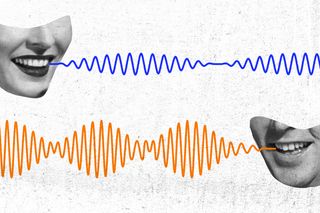
Why We Like Some People’s Voices More Than Others’
Voice is a key ingredient in what makes one look attractive to other people, while speech and intonation play other roles.

There’s more to a person than meets the eye. Voice, in particular, has emerged to be a strong contender in determining how we feel about people. Which is perhaps why dating apps and even social platforms are introducing features to include people’s voices as part of their profiles, teasing out the wonders of hearing people speak. Think of the many interactions, or virtual conversations, where someone’s voice impacted the way people framed their personality.
People have been able to detect “an unexpected range of characteristics from a voice, including the dominance, cooperativeness, emotional state, and even the body size of the speaker,” a 2017 study in Frontiers noted.
Of course, likeability is a broad spectrum of emotions. A voice’s appeal can be romantic, sexual, platonic, and even strictly professional. Voice, as a variable, is contingent on a bunch of factors — such as depth/pitch, social biases, speaking rate, intonation, and how much it resonates with our own speech. What makes someone’s voice particularly desirable is inextricably tied to these ideas.
“The voice is an amazingly flexible tool that we use to construct our identity,” Molly Babel, Ph.D., a linguistics professor at the University of British Columbia in Canada told HuffPost. Not only ourselves, others too. What makes a voice comforting, or sound reliable, determines our interest; this is influenced a bunch of paralinguistic elements.
“If you’re looking for one particular acoustic element which reliably determines how the majority of people feel about a voice,” says Jennifer Pardo, who researches speech communication and phonetics at Montclair State University, “the closest is speaking rate, followed by intonation but it’s not one thing on its own.”
In general, Pardo notes, people who tend to speak a little slower are thought to be friendlier and kinder (as opposed to people who speak faster being perceived as competent in the best-case scenario and nervous in the worst-case scenario).
Intonation — that is, how someone’s pitch changes while talking — is also a factor. Biologically, males have a low pitch, and if their pitch increases as they speak, they are thought to be untrustworthy. The opposite, then, is true too, implying that those who maintain a stable pitch are more likable. For female voices too, if the pitch falls while speaking, they are thought to be untrustworthy.
Plus, continuity in sound is also a marker of general appeal, according to a 2015 study. Think a mother’s voice they use to soothe newborn babies: low frequency and steady sounds are generally far more comforting.
Perhaps this is also why people seek out those speaking in a low, pleasant, soothing voice in ASMR (autonomous sensory meridian response) communities. The impact on our brain is such: it evokes a tingling sensation that puts people at ease and helps them feel relaxed.
Related on the Swaddle:
Is This Normal? “I Can’t Stand the Sound of My Voice”
When translated to real-life situations, or even romantic situations, the differences are notable. Think Leonardo DiCaprio’s two celebrated roles: one, where he roars with passion in “The Wolf of Wall Street” and the other, during the romantic scenes of “Titanic.”The make-up of the voice remains the same in both, but “when we look at the energy accumulated on a specific frequency domain and combine that with other acoustic elements, [his voice in Wolf of Wall Street] scores above the threshold…” Luis Salazar, the founder of a company researching which voices sounds trustworthy and engaging to others, told The Guardian.
Across genders, voices with a touch of breathiness, were equally desirable, as they represented lower levels of aggression. Further, people tend not to like voices that sound creaky — that slight rattle that some voices have. “If you want to avoid having a creaky voice, don’t drink a lot or smoke a lot,” says Grant McGuire, a researcher at the University of California, Santa Cruz.
Another piece of the puzzle is the idea of familiarity. A voice appears more attractive when it sounds similar to ours, according to a 2014 research paper. The reason feels intuitive: the similarity makes us feel like we’re part of a certain social group. An extension of this is, perhaps, a phenomenon called “phonetic convergence,” where people interested in each other tend to start sounding more similar, completely unaware of the effect.
“This similarity can be speech rate (how fast we talking), the pitch or intonation patterns we use, or even the way we produce individual words or sounds,” an article in The Conversation noted. Interestingly, these changes happen unconsciously and automatically, without people realizing that their voices sound different in front of people they may like.
While researchers explore more about the characteristics that make voices sexy in today’s age, it is hard to ignore that a lot of preexisting research harps on heteronormative, patriarchal attitudes about desire.
Researchers have also noted that the current literature relies on popular stereotypes about body images and male/female attraction— that is, the speech of homosexual men is found to have similar characteristics of the opposite sex, i.e., a broadly feminized speech in voice pitch, modulation, and content. Arguably, characteristics of “breathiness” or “pitch” could vary with sexual orientation — but not many studies have tackled the variations across the gender and sexuality spectrum.
In the end, the science and statistics on voice attractiveness may vary across geography, cultures, and even time — but the consensus seems to be that voice remains a key ingredient in the overall “attractiveness package,” as some researchers termed it, referring to smell, voice, and sight. Plus, people with “attractive voices” are just generally perceived to be more likable, honest, and more likely to achieve and, interestingly, more likely to engage in infidelity.
“Voice is about who you are,” Rupal Patel, a speech scientist at Northeastern University, told NPR. “Our voice signals how old we are. Our voice signals our gender. Our voice signals, you know, things about our personality.”
As always, more research won’t hurt our current understanding of the laws and variances of attraction.
Saumya Kalia is an Associate Editor at The Swaddle. Her journalism and writing explore issues of social justice, digital sub-cultures, media ecosystem, literature, and memory as they cut across socio-cultural periods. You can reach her at @Saumya_Kalia.
Related


People Who Practice ‘Survival of the Fittest’ Are More Likely To Be Hostile, Shows Research
